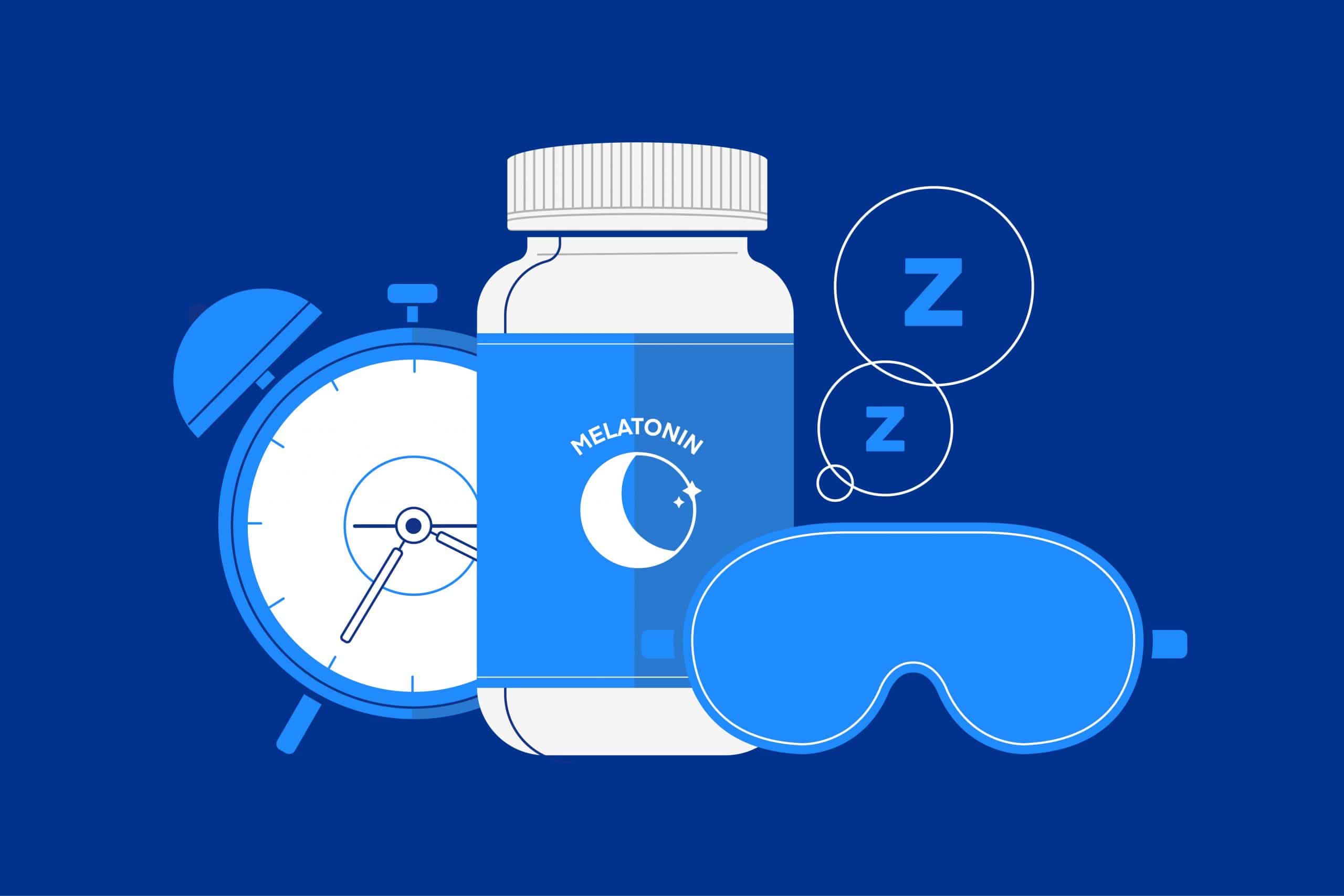Key Takeaways
- Natural Regulation of Melatonin: Melatonin is a hormone naturally produced by the pineal gland in the brain, and its release is regulated by exposure to light. In the presence of light, melatonin levels remain low, keeping us alert, while in the absence of light, such as in the evening, melatonin levels increase, making us feel sleepy.
- Duration of Melatonin Effects: Melatonin supplements affect individuals differently, with some feeling drowsy within an hour of consumption. Typically, melatonin is quickly absorbed, and most people experience its full effects within the first hour. However, the duration of melatonin in the body is relatively short, usually lasting up to four hours. The exact time may vary based on factors such as age, caffeine intake, body weight, and medication interactions.
- Use of Melatonin Supplements: Melatonin supplements are commonly used to address sleep issues, such as insomnia and jet lag, but their dosing and effectiveness can vary among individuals. Due to the lack of standardized dosing guidelines and potential side effects, it’s important to consult a healthcare professional before using melatonin.
Melatonin is a naturally occurring hormone that helps regulate our sleep-wake cycle or circadian rhythm. Its release is regulated by sunlight. When we are exposed to more light during the day, melatonin remains low, and we stay active and alert. However, in the evening, when light decreases, melatonin increases, and we begin to feel sleepy.
Today, melatonin supplements are used as a sleep aid for insomnia and other sleep disorders. (Though, they’re not something we’d recommend.)
Melatonin supplements are also commonly used by those with circadian rhythm disorders, such as shift workers required to sleep at odd hours and those suffering from jet lag. But, many people may not understand how long melatonin can last in the body (and how it can impact our natural circadian rhythms).
To help, we answer this question and explain how melatonin affects sleep.
How Does Melatonin Work?
The pineal gland, located in the middle of the brain, produces melatonin. The suprachiasmatic nucleus (SCN), a group of nerve cells in the hypothalamus, controls the pineal gland through signals that regulate our internal clock.
When the retina absorbs light, it sends a signal to the SCN. The SCN then communicates with the pineal gland to stop melatonin production. In the absence of light, the SCN stimulates the pineal gland and triggers the release of melatonin.
When melatonin levels are high, our body temperature and blood pressure drop. At the same time, the SCN slows down neuronal activity in the brain, helping us prepare for sleep.
How Long Until Melatonin Works?
Melatonin supplements affect each person differently. While one person may become sleepy within 1 hour of taking the supplement, others may feel tired after 10 to 15 minutes. However, melatonin is quickly absorbed by the body, so most people feel the full effect within the first hour.
Most melatonin supplements are released into the bloodstream immediately after taking them. However, some formulations are designed for extended-release. This means small amounts of melatonin enter the bloodstream over time. Time-released melatonin is intended to mimic the body’s natural production of melatonin, which occurs throughout the night.
How Long Does Melatonin Stay in Your Body?
In general, melatonin doesn’t stay in the body for long. The half-time of the supplement, the time it takes for your body to metabolize half of the dosage, is about 30 to 40 minutes. In most cases, it takes 4 to 5 half-lives for your body to eliminate the supplement. Therefore, melatonin can stay in your body for up to 4 hours.
For this reason, we recommend you avoid driving or operating dangerous equipment at least 5 hours after taking the supplement. However, because melatonin affects each person differently, it may take longer for it to clear your system. The following factors could affect how long melatonin remains in your body.
- Age: Early research shows that melatonin may stay active for longer periods of time in older individuals.
- Caffeine intake: Caffeine is a stimulant that may counter the effects of melatonin.
- Body weight: Heavier individuals (those over 250 pounds) may not feel the effects of a small dosage of melatonin.
- You are taking other medications: Blood pressure, hypertension, immunosuppressant, and diabetes medications, as well as blood thinners and other anticoagulants, may change the way your body processes supplemental melatonin.
How Much Melatonin Should You Take?
The United States Food and Drug Administration (FDA) classifies melatonin as a dietary supplement, similar to vitamins and minerals. This classification means that melatonin is not regulated in the same way prescription or over-the-counter medications are. Therefore, there are no safe dosage guidelines for melatonin, making it difficult to determine the right amount to take.
Additionally, melatonin affects each person differently. A low dose of melatonin (0.5 mg) may cause extreme sleepiness in one person and have no effect on another. There is also conflicting evidence on whether or not this supplement is safe for pregnant women or young children.
“Melatonin supplements are available in a wide range of doses. Doses can be as low as 0.3 milligrams to as high as 10 milligrams. Additionally, melatonin supplements are available in a variety of formulations. Examples include oral capsules or tablets, sublingual liquid or sprays, topical creams or drops, and intravenous preparations. Moreover, melatonin is available in different release forms such as immediate, extended, and timed release. The duration and elimination of melatonin depends on all of these factors as well as individual demographics and metabolism,” says Dr. David Gao of Memorial Sloan Kettering Cancer Center.
Due to these risks, we suggest avoiding melatonin use altogether and, instead, try to increase your melatonin levels naturally through diet, exercise, and light exposure.
Who Should Not Take Melatonin?
- Children: Melatonin can affect hormone levels and may interfere with normal development in children. It is recommended to consult a pediatrician before giving melatonin to children.
- Pregnant or breastfeeding women: There is limited research on the safety of melatonin during pregnancy or while breastfeeding. It is advisable for pregnant or breastfeeding women to seek medical advice before using melatonin.
- Individuals with certain medical conditions: People with autoimmune disorders, depression, epilepsy, diabetes, or those taking certain medications should consult a healthcare professional before using melatonin, as it may interact with these conditions or medications.
Frequently Asked Questions
What are the side effects of melatonin?
Many people use melatonin pills to fall asleep quickly at their desired bedtime and maintain a consistent sleep-wake cycle. However, too much melatonin in the body can actually make it harder to fall asleep and cause frequent nighttime disruptions. Plus, since there are no safe dosing guidelines, it can be difficult to determine the correct dose of melatonin.
The following are side effects of taking too much melatonin Verified Source National Library of Medicine (NIH) World’s largest medical library, making biomedical data and information more accessible. View source :
- Sleep loss
- Headache
- Nausea
- Anxiety and depression
- Diarrhea
- Joint pain
- Seizures
- Dizziness
- Abdominal pain
- Mild tremors
Will taking melatonin cause my body to stop producing it?
There is no evidence to suggest that taking a melatonin supplement will cause your body to stop producing the hormone naturally. However, when caffeine is combined with melatonin, it may inhibit the body’s natural ability to produce this hormone.
What foods are rich in melatonin?

There are several foods rich in melatonin and can help you get to sleep naturally. Fruits and vegetables such as cherries, spinach, tomatoes, and bananas contain melatonin. Other foods, such as honey, turkey, sweet potatoes, oats, and almonds, encourage natural melatonin production. Any of these foods can make a healthy bedtime snack.
Can melatonin cause nightmares?
While some evidence suggests that melatonin can decrease REM sleep disorders, such as sleepwalking and night terrors, other studies Verified Source National Library of Medicine (NIH) World’s largest medical library, making biomedical data and information more accessible. View source suggest that high melatonin levels may cause lucid dreaming.
Vivid dreams when taking melatonin are often caused by high levels of vasotocin in the brain. Vasotocin is produced by melatonin and is responsible for erasing memories while you dream. Too much melatonin in the body could lead to prolonged periods of memory-erasing sleep, which causes vivid dreams. Lucid dreams can often lead to daytime sleepiness and grogginess.
Is melatonin bad for your liver?
Although melatonin was thought to cause serum enzyme elevation in the liver, current research Verified Source National Library of Medicine (NIH) World’s largest medical library, making biomedical data and information more accessible. View source shows that melatonin was not associated with this change or any other cases of liver injury. However, if you have experienced liver complications in the past, it is best to seek medical advice before taking melatonin supplements.
Conclusion
In general, melatonin remains in the body between 4 and 5 hours. However, due to unregulated dosing guidelines, many people may not understand exactly how much melatonin they should take. This can lead to overconsumption of the supplement and a melatonin overdose, with dangerous side effects. Before you begin taking melatonin, we suggest discussing it with your doctor first.
About the author
McKenzie Hyde is a Certified Sleep Science Coach and a full-time writer specializing in sleep health and the mattress industry. With a Master of Arts degree in literature and writing from Utah State University, McKenzie combines her passion for writing with her in-depth knowledge of sleep science. Her articles cover a wide range of topics, including best sleep practices for students, the consequences of sleep deprivation, and choosing the right mattress for back pain relief. McKenzie's dedication to delivering accurate and informative content makes her a valuable contributor to the field of sleep health.
View all posts




